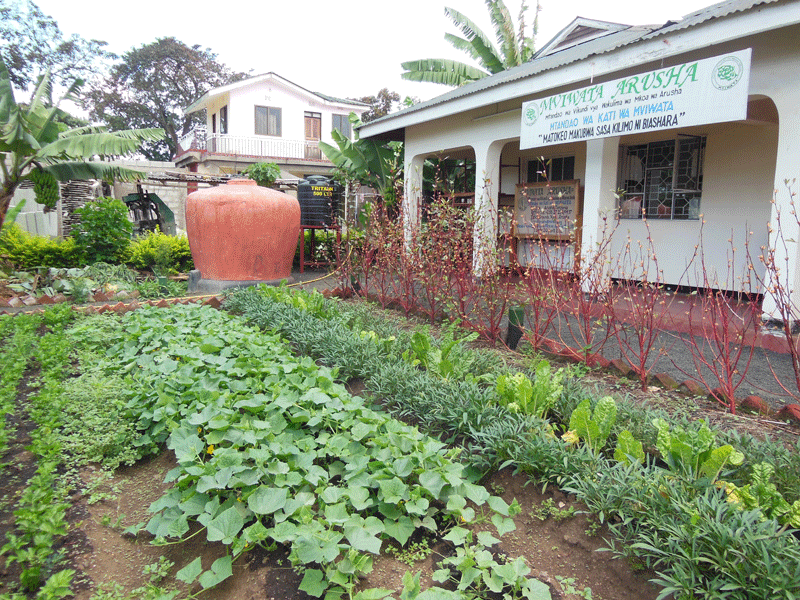The defender of the farmer
TANZANIA FARMERS’ UNION
WHEN GRAIN FARMER Richard Kipara first joined the local farmers’ union in Arusha, Tanzania he was what is considered ‘food insecure.’ But after participating in training programs focused on post-harvest handling, and viewing on-site demonstration plots, just two years later Kipara is ‘food secure’ — he has even been able to expand his production.

Kipara is not the only farmer in Tanzania to benefit from working with MVIWATA, short for Mtandao wa Vikundi vya Wakulima Tanzania. Since the national farmers’ organization was first founded in 1993, it has served 6,762 smallholder farmer- members from 256 groups in the Arusha region alone. Across the country, MVIWATA has more than 100,000 members. Of those, 60 per cent are women who typically do not have access to capital or markets.
UNITING FARMERS
MVIWATA’s motto in Swahili, “Mtetezi wa Mkulima ni Mkulima Mwenyewe,” literally means “the defender of a farmer is the farmer”. That was, and still is, the goal of the organization which was formed by 22 innovative farmers from seven regions throughout Tanzania. Their purpose: to create a farmer-to-farmer exchange forum that unites small-scale farmers, enhances communications, defends their interests, and addresses their challenges.
The work they have done to date is incredible. MVIWATA has helped the region develop economically by lobbying and advocating on behalf of farmers with regards to land issues, market improvement, and skills building. Lobbying and advocacy has increased market opportunities; and as a result, Tanzanian farmers are now able to sell their products to neighbouring countries.
Using what they call study cycles, farmers share their knowledge and skills in an attempt to improve production. In the drier areas, MVIWATA works with farmers to establish irrigation canals and teaches them how to adapt to climate change. In other areas, growers are taught how to produce value-added products like honey and vegetables. Dairy farmers have seen improvement through better breeding and the introduction of artificial insemination.
MANAGEMENT
MVIWATA also provides its farmers with access to capital through a microfinance organization called SACCOS. Whereas the regular banks charge 20 per cent interest, SACCOS charges between seven and 10 per cent. The bank is managed by farmers and is linked to government departments. Its goal is to teach farmers how to better manage their funds.
Since its inception, MVIWATA has successfully increased food security for its Tanzanian members by 26 per cent. For grain farmers like Kipara, increased food security means a reduction in post-harvest losses. Most grain loss occurs because of wildlife and spoilage, says Damian James Sulumo, MVIWATA’s program officer. Farmers, he says, are taught how to reduce losses due to wildlife, and how to build small grainaries made of bags covered in cement for storing grains. The organization, says Sulumo, is working to further support grain farmers. Recently, they raised some €50,000 (approximately $66,000) to construct a factory for processing products like maize meal.
To help growers increase production, MVIWATA offers access to certified seed, such as beans (lyamungo) and maize (lishe). Using demonstration plots, they show farmers which varieties are best suited to their region and how crops grow with or without fertilizer.
Despite their good work, MVIWATA still faces a number of challenges. In particular, says Sulumo, the organization’s resources, which are needed for community development initiatives, are very limited. Climate change has increased drought in the country, and there are cultural barriers to contend with. In recent months, the organization has been working to strengthen market opportunities for local rice farmers who are competing with cheap rice imports from Pakistan.
MVIWATA’s success has been acknowledged through several awards. In 2010, the organization won the Civil Society Organizations award of excellence and they have had first place winners at every farmer exhibition since 2008. Most importantly though, MVIWATA has changed the lives of thousands of Tanzanian farmers, helping them to rise above poverty and make a profitable career out of farming. •








